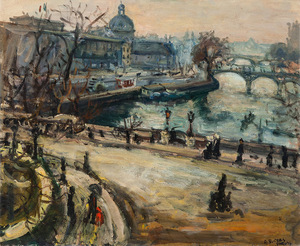Neemija Arbit Blatas: Lithuanian shtetl in Paris 7
In brief: Almost all the Litvak artists of the first half of the 20th century who started their life in soon to be or already independent Lithuania, later immigrated to Paris, France. It is impossible to understand the phenomenon they had created there without knowing about the Litvak shtetl tradition.
Shtetl is a Jewish street in many Lithuanian and other Eastern and Central European towns and larger cities of the countries that were restoring their independence.
The interwar Lithuanian shtetl is a living social fabric based on what sociologists call classification - people learn one or another form of conduct, therefore they do not need to continue learning new behavior patterns every day. In Lithuanian cities and towns, Jewish people created the urban methods of cultural operation instead of agricultural.
In the 10's and 20's artists who had already received their education in Lithuania and wanted to continue studying abroad, immigrated en masse to the art center of the time - Paris. Paradoxical, but what is described as a Paris School of Art, originated, namely, from the logic of the Litvak shtetl life. A community was formed where no one felt upstaged by the colleague and everyone was recognized according to his abilities, talent and work.
Neemija Arbit Blatas, born and intermittently raised in Kaunas, where he also studied, is one of the most distinctive artists who has strongly conveyed the sociability of the Jewish sthetl. Arbit Blatas, who has never disowned his origin and who has studied in Germany and Paris started by creating Impressionist-style paintings. Kaunas and Paris are two kindred cities in his imagination. The longing for Kaunas that turned into a Parisian impression brought these cities closer together. Most of N. Arbit Blatas' works are landscapes that feature a street, river or a tree.
His later works that already show the adaptation to the new environment contain less features of impressionism. Kaunas sentiment is not as important, but it is clear that the artist's worldview and foundations of the practical philosophy were born and developed in Lithuania.
N. Arbit Blatas work is important today, because it says that human identity does not have to be that strongly connected to a place: if creativity is strong and one goes into the world openly, the native places can be recreated anywhere.

